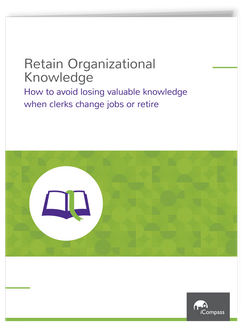Retaining Organizational Knowledge: An Urgent Issue for Local Government Leaders
When municipal clerks change jobs or retire, local governments can lose much of the valuable organizational knowledge they need to provide essential services, preserve local history, and comply with legislative mandates. Indeed, the biggest threat to local governments’ management and curation of information may be the staff members who built those processes in the first place.

Retaining organizational knowledge: Why local governments must act now
Many local governments still use manual processes to manage meeting agendas and public records, and frequently file paper documents in manila folders and cardboard boxes. Because municipal clerks created many of those processes and filing systems, they may be the only ones who understand how they work and know where to find the information.
Municipal clerks also have extremely complex jobs. Half of all clerks routinely fill at least two key roles as part of their jobs, with some wearing as many as three or four hats. As a result of the complexity of the jobs they perform and the number of roles they play at work, municipal clerks possess an extraordinary amount of specialized organizational knowledge. When clerks leave, that knowledge goes with them, which mak
es it difficult to impossible for local governments to maintain and provide the information the law requires.
Meanwhile, the likelihood of individual clerks leaving their jobs is increasing daily.
Our 2014 survey of municipal clerks in North America found that more than 60 percent were over 50 years old and more than 20 percent were over 60. In the February 2015 issue of Government Finance Review, Neil E. Reichenberg, executive director of the International Public Management Association for Human Resources, wrote: “The Center for State and Local Government Excellence (SLGE) recently found that nearly 30 percent of state and local government employees have delayed retirement. Still, since no one has figured out how to delay aging, the number of retirements will increase. According to the SLGE
2014 Workforce Trends survey, 49 percent of the responding state and local governments reported higher levels of retirement in 2013 than in 2012.”
In addition, numerous studies have shown that workers today typically change jobs six to eight times during their careers. The pending retirement of so many municipal clerks along with increasing workforce mobility could lead to a significant loss of organizational knowledge by local governments throughout the United States and Canada.
Technology: The key to Local Government Knowledge Retention
The best way to ensure that organizational knowledge is easily accessible and widely shared is through the strategic use of technology solutions designed to replace manual processes with paperless systems, eliminate wasteful duplication and repetition, and lighten the workload of municipal employees.
A key technology solution for local government leaders to consider is one that automates the creation and publication of meeting agendas and other government records. Agenda management solutions make important government information easily accessible by municipal employees as well as members of the public. These digital systems make information searchable and enable automated processes that are highly repeatable.
Data streaming is another key solution for many local governments. By streaming data directly to a government website and automatically refreshing information as staff members work throughout the day, these systems provide better public access to current information and reduce the workload for municipal employees by making it unnecessary for them to post frequent updates.
Faced with the loss of critical organizational knowledge, local government leaders throughout North America must act quickly to address this growing threat.
To learn more about strategies on how to retain local government knowledge download the white paper: How to Avoid Losing Valuable Knowledge when Clerks Change Jobs or Retire


